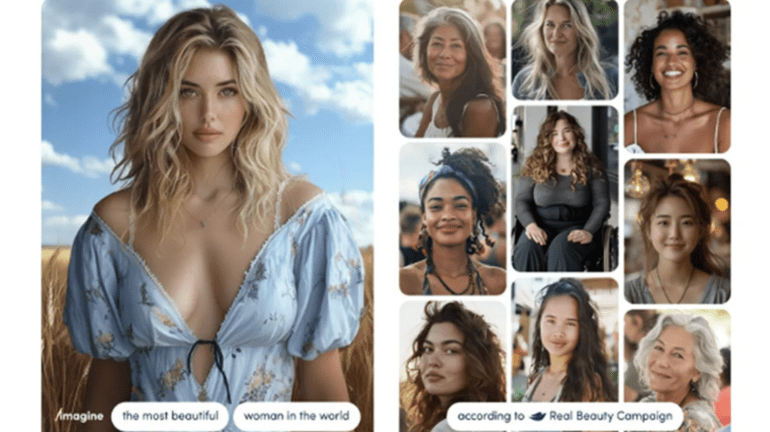- Dove pledges to refrain from using AI models in its advertising campaigns, citing AI as a significant threat to portraying genuine beauty.
- An advertisement vividly illustrates the potential harms of current AI tools, depicting women encountering text prompts resulting in flawless but unrealistic outcomes.
- All AI-rendered images in the commercial were created using genuine generative AI tools.
- Dove aims to differentiate itself from competitors by committing to not using AI-generated models in its future advertising efforts.
- The brand believes AI could worsen the negative impact of online beauty standards, with the majority of women surveyed admitting exposure to harmful content online.
- Reference is made to a forecast suggesting that 90% of online content will be AI-generated by 2025.
- Dove’s CMO emphasizes the brand’s commitment to empowering women to define real beauty without algorithmic influence.
- Despite concerns, Dove acknowledges the growing adoption of generative AI and seeks to guide enthusiasts responsibly through the launch of Real Beauty Prompt Guidelines.
- Dove underscores the ongoing challenges in reshaping societal perceptions of beauty through its partnership with Edelman’s DXI division.
Main AI News:
Dove’s recent declaration stands firm against the integration of AI models in place of authentic women in its advertising campaigns. In a bold move, Dove identifies AI as a significant impediment to portraying genuine beauty accurately, drawing a clear distinction between this emerging technology and the airbrushed imagery it has actively combated since its inception two decades ago. A poignant advertisement vividly illustrates the potential dangers of current AI tools, depicting women surrounded by dimly lit rooms as they encounter text prompts like “a gorgeous woman” and “perfect skin,” resulting in cartoonishly flawless outcomes set against a somber rendition of “Pure Imagination.”
Every AI-rendered image featured in the commercial was created using genuine generative AI tools, according to the company. Soko, an independent agency based in Brazil, spearheaded the development of this global marketing initiative.
Dove seeks to set itself apart from its competitors in the beauty industry by making a commitment to refrain from employing AI-generated models in place of real women in its future advertising endeavors. The stalwart Unilever subsidiary fears that AI could exacerbate the already detrimental impact of negative online beauty standards, a sentiment echoed by nine out of ten women and girls surveyed by the brand who admitted to encountering harmful beauty content online.
Referencing a forecast suggesting that 90% of online content will be AI-generated by 2025, as cited by author Nina Schick during a CES panel discussion in 2023, both the press release and “The Code” ad underscore the potential ramifications. Schick had previously indicated that a vast majority of online content could be at least partially AI-generated within the specified timeframe.
Alessandro Manfredi, Dove’s CMO, emphasized the brand’s commitment to empowering women to define real beauty on their terms, free from the influence of algorithms. Manfredi stated, “At Dove, we seek a future in which women get to decide and declare what real beauty looks like — not algorithms. As we navigate the opportunities and challenges that come with new and emerging technology, we remain committed to protect, celebrate, and champion Real Beauty. Pledging to never use AI in our communications is just one step. We will not stop until beauty is a source of happiness, not anxiety, for every woman and girl.“
However, Dove also recognizes the growing prevalence of generative AI adoption, particularly with the rise of software like ChatGPT. An internal study revealed that a significant portion of women in the U.S., 24%, and girls, 41%, perceive the use of AI to create alternate versions of themselves as empowering. In response, Dove aims to guide these enthusiasts responsibly through the launch of the Real Beauty Prompt Guidelines, which offer inclusive language recommendations for maximizing the benefits of popular generative AI programs such as Midjourney and DALL-E.
Despite the progress made in broadening beauty definitions since 2004, Dove stresses that there is still considerable work to be done. In collaboration with Edelman’s DXI division, the brand compiled a report titled “The Real State of Beauty,” which revealed that over one in three women would willingly sacrifice a year of their life to attain their ideal appearance. This comprehensive study, which engaged over 33,000 respondents across 20 countries, highlights the ongoing challenges in reshaping societal perceptions of beauty.
Conclusion:
Dove’s decision to eschew AI in its advertising signals a strategic shift towards championing authenticity and real beauty standards. This move reflects a growing recognition within the market of the detrimental effects of AI-driven imagery on societal perceptions of beauty. As consumers increasingly prioritize authenticity and inclusivity, brands that embrace similar initiatives may gain a competitive edge in the evolving landscape of beauty marketing.

